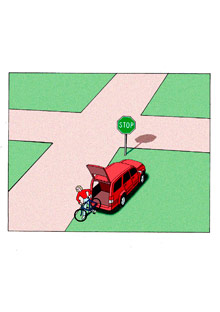Getting Over Eco-Guilt

Illustration by Guy Billout
As if in-laws, bosses, and religion didn't provide enough guilt to last a lifetime, these days we're beating ourselves up for formerly mindless infractions like pitching a soda can into the garbage. "Green guilt" is the latest type of self-flagellation to befall womankind. And we're not making the gender reference lightly. A Yale survey of both sexes found that women are definitely more wound up over the Earth's distress.
Here's the thing—and it may come as a surprise: There's nothing wrong with guilt. "It holds society together," says David Amodio, PhD, assistant professor of psychology at New York University. "Without it, people wouldn't be motivated to maintain social norms." Even from a practical standpoint, it's guilt that often drives us to change behaviors and take action. "We spend so much time trying to be guilt-free," says June Tangney, PhD, professor of psychology at George Mason University in Fairfax, Virginia, "and that's a mistake."
The guilt we all know and don't love, however—the consuming kind—comes from not taking action, or when shame gets mixed in ("I feel so bad about what I did" turns into "I'm a horrible person for what I did"). With green guilt, the cure is easy: Take small actions to help the environment (a reusable cloth grocery bag here, recycled paper there), and let yourself off the hook for the rest. Remember: You personally did not cause global warming, and shouldn't feel responsible for fixing it. "Ask yourself, 'What are reasonable goals for me, knowing that I can't take care of everybody and everything?'" says Tangney. "Once you translate the most important things into doable plans, you'll feel a lifting of some of this moral weight."
Daniel Esty, director of the Yale Center for Environmental Law & Policy, which conducted the survey, emphasizes that small adjustments make a big difference. "A few 'supergreens' will go through their homes and rip out every incandescent bulb," he says, "but for most people the right answer is, when the light burns out, put in a compact fluorescent. It's simple, it's cost-effective, and you're not wasting things before the end of their useful lives." And do what you can, he says, on big issues like getting greenhouse gas emissions down—for instance, biking or carpooling to work once a week. "The goal is to move from the neglectful end of the spectrum toward the purposeful end. As everyone takes a step in that direction, we'll all make a lot of progress." If the guilt starts to rise, Esty adds, just remind yourself: No one's perfect—including Al Gore.
What do you want for the world?
Here's the thing—and it may come as a surprise: There's nothing wrong with guilt. "It holds society together," says David Amodio, PhD, assistant professor of psychology at New York University. "Without it, people wouldn't be motivated to maintain social norms." Even from a practical standpoint, it's guilt that often drives us to change behaviors and take action. "We spend so much time trying to be guilt-free," says June Tangney, PhD, professor of psychology at George Mason University in Fairfax, Virginia, "and that's a mistake."
The guilt we all know and don't love, however—the consuming kind—comes from not taking action, or when shame gets mixed in ("I feel so bad about what I did" turns into "I'm a horrible person for what I did"). With green guilt, the cure is easy: Take small actions to help the environment (a reusable cloth grocery bag here, recycled paper there), and let yourself off the hook for the rest. Remember: You personally did not cause global warming, and shouldn't feel responsible for fixing it. "Ask yourself, 'What are reasonable goals for me, knowing that I can't take care of everybody and everything?'" says Tangney. "Once you translate the most important things into doable plans, you'll feel a lifting of some of this moral weight."
Daniel Esty, director of the Yale Center for Environmental Law & Policy, which conducted the survey, emphasizes that small adjustments make a big difference. "A few 'supergreens' will go through their homes and rip out every incandescent bulb," he says, "but for most people the right answer is, when the light burns out, put in a compact fluorescent. It's simple, it's cost-effective, and you're not wasting things before the end of their useful lives." And do what you can, he says, on big issues like getting greenhouse gas emissions down—for instance, biking or carpooling to work once a week. "The goal is to move from the neglectful end of the spectrum toward the purposeful end. As everyone takes a step in that direction, we'll all make a lot of progress." If the guilt starts to rise, Esty adds, just remind yourself: No one's perfect—including Al Gore.
What do you want for the world?



